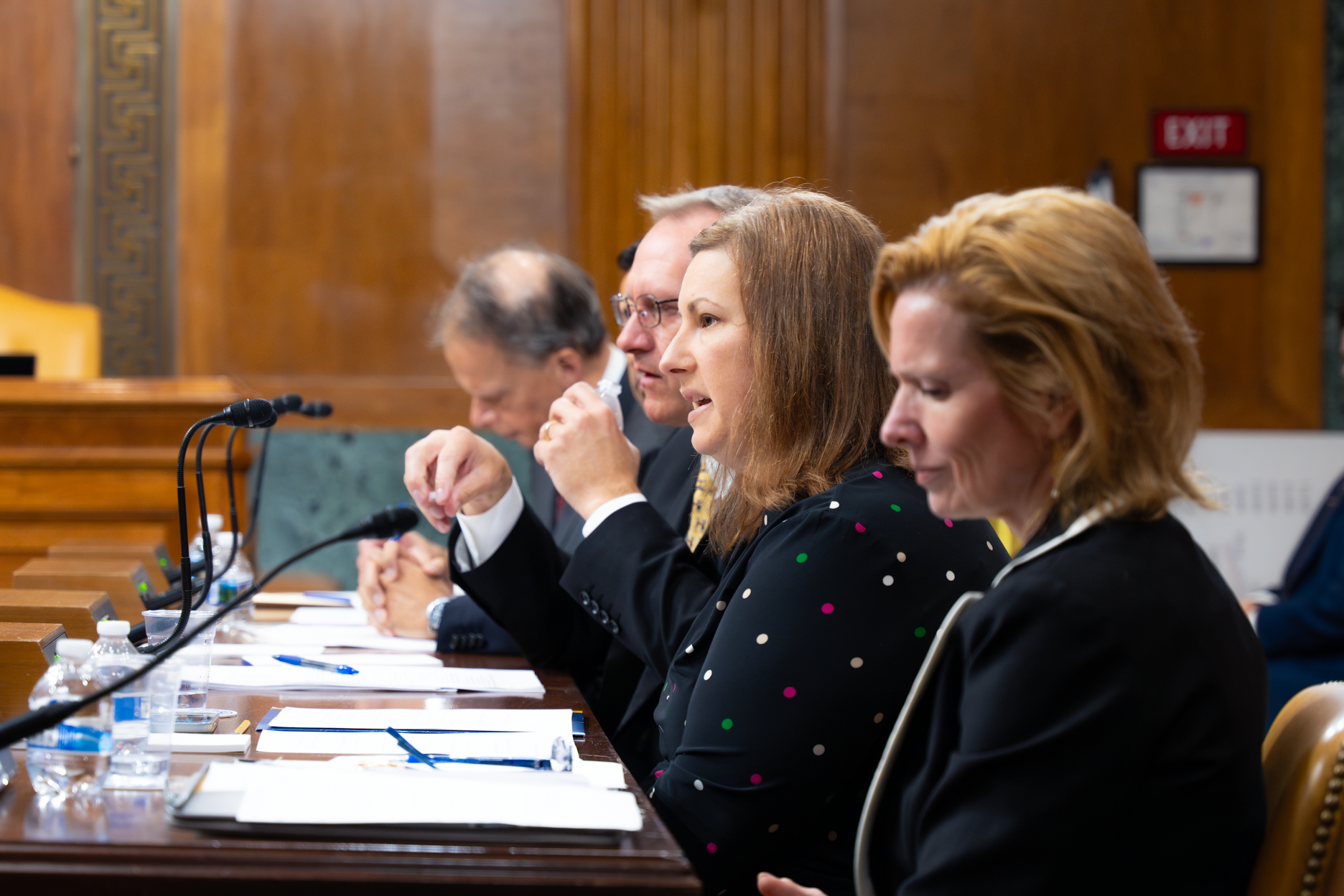Lisa Grabert has experience in a place few professors or nurses ever see: the United States Congress.
She desperately wants company.
“We hope we can get more faculty, both nursing and otherwise, to go to Congress, to go to the state house in Madison, to go to city council meetings in Milwaukee and share their expertise. There are a lot of different ways that people can engage with policymakers and disseminate their research,” Grabert says.
Grabert has given two Congressional testimonies within the past year: one in spring 2023 in front of the Senate Committee on Homeland Security and Governmental Affairs and another in March in front of the Senate Budget Committee. Members invited Grabert to answer questions about important issues relating to national legislation currently under consideration. A unique mix of academic credentials and policy expertise, the latter of which was gained through time as a staffer on the U.S. House Committee on Ways and Means, made Grabert an appealing option to be a congressional witness.
“I worked with Medicare for a long time and it’s the largest purchaser of health care services in the world,” Grabert says. “When Medicare makes a change, everyone else follows, so working in the public sector allows you to have a huge impact on health care delivery.”
How does someone get invited to testify about an issue? There are lots of experts about any issue that Congress wants to know about; how do they select the one that they want?
Academicians are a pretty sought-after group for congressional testimony because they have a body of research, they’ve published a lot and that gives staff some comfort in calling them as witnesses because there’s a public record they can use to vet you. Academic witnesses are also pretty neutral, politically. Many of them aren’t looking at their issues through a political lens; that research and evidence-based mindset makes them a great source to testify.
From there, a lot of it is just relationships. Spending time in Congress or in public policy makes you a little more top of mind. Oftentimes, senators and representatives will try to call people from their home states as well.
You’ve been called to testify twice. What are the issues that you were speaking about?
Last spring’s testimony was about prior authorization, which is a way in which private health insurance companies will manage utilization of services on behalf of their members. I was testifying as the minority witness and my job was to educate the members on what it is, how it’s used in the Medicare program and how the changes they were trying to make to it could have significant budgetary effects.
This year’s testimony was about primary care and growing programs that were put into place in conjunction with the Affordable Care Act, which was signed into law in 2010. There are a bunch of programs in there that Sen. Sheldon Whitehouse (D-RI) was interested in expanding and a few of them have not really saved money in the way they were supposed to. My role was to talk about why and to suggest alternatives.
What materials do you have to provide a committee before you testify?
You have to submit a written testimony, which is basically a summary of what you’re going to say. There’s no approval or denial process for this; whatever you submit for a testimony is what the committee is going to take. I was able to do whatever I wanted with it, but it’s due 24 hours before the hearing so they can distribute the testimony to the members and staff with advance notice.
How does the process of fielding questions from the members work?
You first read your written testimony and highlight your main points. After each witness reads their statements, the individual senators get to ask questions. Each senator has five minutes to do so, but they oftentimes take more. They can ask whatever they want and they’re prepared on what to ask by their staffs. You may know the questions ahead of time, but oftentimes you don’t.
What does it feel like to be in front of a committee? Are you nervous, excited, etc?
It’s helpful to take a beat and write down their questions so you really are hearing what they say and not getting carried away in the moment, because that’s easy to do. You have to remind yourself to put a filter on and not say the most immediate thing that comes to mind. Then, you just have to remember to be honest with them. Even if you don’t know the answer, it is perfectly OK to say that.
What’s something that people get wrong about Congress? On the flip side, what’s something about Congress that matches the public perception?
A lot of people think that all Congress does is fight and that it’s a very red vs. blue institution. My experience has been that Congress is actually very bipartisan. I think people get that wrong a lot. The example I always use in favor of bipartisanship is that I wrote 40 different policies when I was a staffer that were signed into law and every single one of them moved in a bipartisan bill. I never wrote a single policy that became law in a party-line vote.
The public also assumes that Washington, D.C., is a bit of a pay-to-play place and there is an element of truth to that. There are organizations that probably have undue influence over the policymaking process that, if the public knew more details about it, they would find somewhat unsavory. A lot of special interests invest time and resources into protecting the status quo.
There are going to be a lot of people reading this who think of themselves as apolitical. What is your best argument for why people should want to engage with the political process?
If you ignore politics, it’s going to be a limiting step in whatever change you want to make. The reason people should pay attention to politics is because you must be aware of the best way to put your issue in front of people.
A lot of people in my class tell me they’ve never thought about policy and have even less of an appetite for politics. I tell them that’s fine; that’s where everybody starts. By the end of the semester, they feel a lot more comfortable and confident using the advocacy process.



